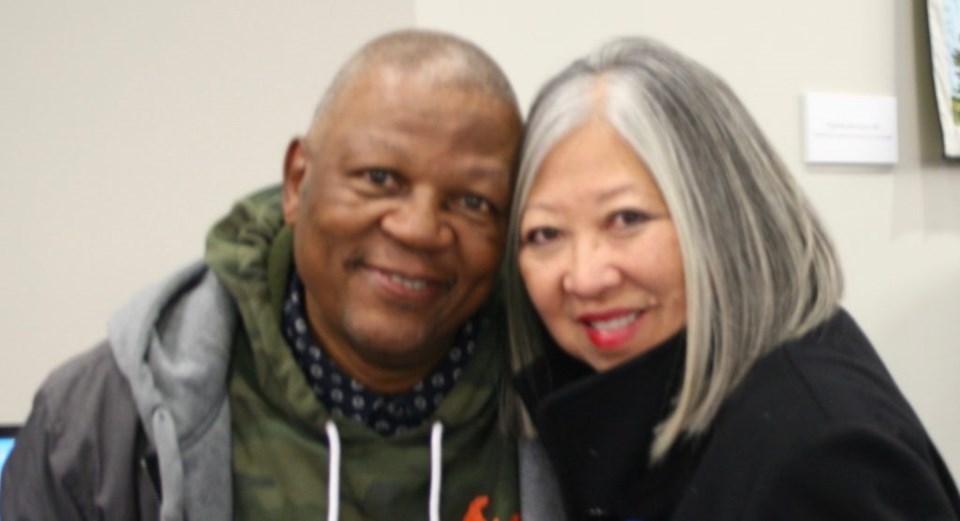
A little bit of South Africa came to the Niagara-on-the-Lake Public Library last Thursday.
As part of the Voices of Freedom Festival, hosted by Bravo Niagara!, bass player Bakithi Kumalo, best known as a key member of Paul Simon’s band for more than 30 years, introduced a film about the landmark Graceland album to an audience of about 70 people.
Under African Skies follows Simon on a trip back to Johannesburg 25 years after the 1986 release of the album that popularized African, and World music in general, across the globe.
Recorded under the shadow of Apartheid, Graceland ruffled the feathers of the organization Artists Against Apartheid, who had pushed for a creative boycott of the country under ongoing extreme racial tension.
Kumalo was there for the recording of the album, as well as for that 2011 reunion with many of the musicians involved in the sessions.
Born into a musical family in Soweto, Kumalo had been working in an auto garage when he received a call from producer Hendrick Lebone, inviting him to the studio. It seems Simon had heard Kumalo’s bass playing on a bootleg cassette of South African township music, with which he had become fascinated.
When his boss told him Paul Simon was looking for him, Kumalo had no idea who the singer-songwriter was. “Nobody with an English name would be looking for me, unless there was a problem,” he said. Once he was informed it was a singer from America who was looking for him, excitement set in, and his boss actually gave Kumalo the money he needed to take the bus to the studio.
Shortly after the sessions in Johannesburg, Simon flew Kumalo and other South African musicians to New York City, to continue recording. He described the culture shock of trying to cross the busy streets, and eating sushi for the first time.
Kumalo and Simon gelled, and Graceland became a turning point in the bassist’s career and life. While blacks in South Africa were struggling under President P.W. Botha’s National Party regime, Kumalo tasted freedom for the first time.
He ended up moving to the U.S., and has toured the world for more than half of his life as a member of Simon’s band. Kumalo continues to live, and raise his family, in Pennsylvania.
Under African Skies catches up with Kumalo and many other South African musicians and singers who were involved in the landmark recording of Graceland.
Simon’s 2011 trip served as a chance for him to not only reconnect with those who supported his vision, but also as an opportunity to see first-hand the results of the cultural shift that perhaps began with that album, and resulted in the abolition of Apartheid by 1993.
Though it’s clear Simon’s 1985 decision to record in Johannesburg was controversial, the film makes it obvious each of the musicians involved relished the opportunity to collaborate with him.
Joseph Shabalala of the singing group Ladysmith Black Mambazo credits Simon for opening up the world to his music. The success of the Graceland album has resulted in the group being able to continue to tour the world to this day.
He, and others, say the black artists who toured with Simon in 1987 wanted to be out on the road with him.
Of course, the film is rife with the music of Graceland, bringing the viewer into the studio to experience first hand how the two cultures came together to produce a sum that was much greater than its parts, at least commercially. The album ended up selling 16 million copies, and has been re-released in updated versions twice.
The joy on the faces of all the musicians is evident throughout both the original footage, and the reunion scenes 25 years later.
Probably the most intriguing part of the film is Simon’s meeting with Dali Tambo, the founder of Artists Against Apartheid and the son of Oliver Tambo, the president of the African National Congress from 1967 to 1991.
Simon and Tambo agree to disagree about whether or not the singer was justified in recording in South Africa with local musicians. There is talk about a “misunderstood legacy,” as Simon says they all “treated each other as equals as musicians.”
The film concludes with Simon’s apology to Tambo, as the two discuss the political disputes of the past. But it’s clear that looking back, both Tambo and Simon agree it’s music that brought people together then, and continues to do so today.
Experiencing Under African Skies in the presence of a key player who was there was a once-in-a-lifetime opportunity for those in attendance.